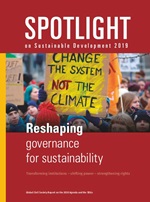Human rights risks of multi-stakeholder partnerships: the Scaling Up Nutrition Initiative
Published on Tue, 2020-02-25 09:49
The potential of partnerships with the private sector dominated the narrative characterizing the initial phase of implementation of the 2030 Agenda for Sustainable Development. In relation to SDG 2, a prominent multi-stakeholder platform is the Scaling Up Nutrition ‘Movement’. Laura Michéle and Kavya Chowdhry (FIAN International), Patti Rundall (IBFAN) and Stefano Prato (SID) explain that as documented by a multi-country study, this case exposes how interventions promoted by MSPs often do not address the social, cultural, economic and political determinants of malnutrition and rather emphasize short-term, technical interventions, owing to private sector influence in the context of a consensus driven process. The case of SUN shows that interventions promoted by MSPs often do not address the social, cultural, economic and political determinants of malnutrition and rather emphasize short-term, technical interventions, owing to private sector influence in the context of a consensus driven process. The resulting initiatives tend to only target a small part of the problem and largely benefit the private actors. SUN’s need to satisfy the needs of its private sector constituencies favours market-led approaches that inevitably over-emphasize commercially produced foods and technical interventions. Meanwhile SUN fails to address or even acknowledge the importance of issues such as power relations, social exclusion, exploitation, poverty, discrimination, low pay, land grabbing, genetically modified organisms (GMOs), abusive marketing of food products and child labour, all of which can cause forms of malnutrition and hunger. Initiatives such as SUN further contribute to the consolidation of private sector influence on public food and nutrition policies. By shifting policy accountability from the state to multi-stakeholder platforms with multiple actors, the government becomes a facilitator among many, rather than the primary actor in addressing malnutrition. This makes it even more difficult for affected groups to hold the state accountable for compliance with its human rights obligations, and moves us further to a charity-driven, rather than a rights-based approach to food and nutrition. By Laura Michéle, FIAN International and Kavya Chowdhry, FIAN International and Patti Rundall, IBFAN and Stefano Prato, SID. Read this chapter here. |




